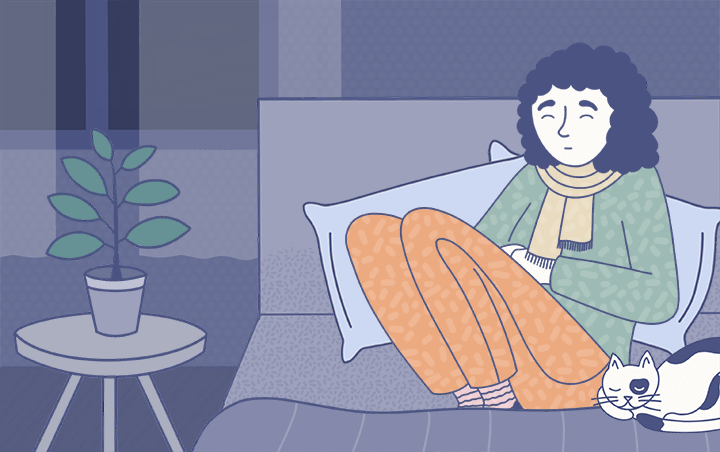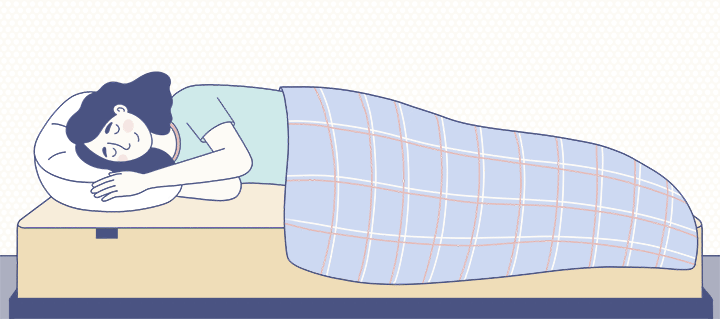You probably know quality sleep is essential for mental and physical health. And you may have heard that scientists are finding more and more links between gut health and wellbeing (hello, probiotics craze!). What fewer people realize is sleep and gut health are intimately related.
Over the past decade or so, a range of studies have suggested sleep plays a major role in gastrointestinal and metabolic health—and vice versa. As it turns out, the state of our “gut microbiome” (the thousands of microorganisms living in our gastrointestinal tract) can influence our ability to obtain quality sleep. Meanwhile, our sleep quality impacts whether our bodies maintain a healthy gastrointestinal system.
It seems the rhythms of our biological clock might correlate to fluctuations in our gut microbiome—or so says a growing body of research into the “mind-gut connection.” Our brains are closely linked to both our guts and our sleep systems, which helps explain how sleep and gut health intertwine.
If that all sounds hopelessly complicated, we’re here to help. Here’s a beginner-friendly guide to understanding the relationship between sleep and gut health so you can sleep (and feel) better for life.
The Impact Of Sleep On Gut Health And Digestion
We spoke with Jessie Howkins, Holistic Health Practitioner, about gut health and its relationship to sleep. Howkins says, “A gut experiencing dysbiosis, or imbalance in gut bacteria, can lead to increased cortisol levels and inflammation in the body, causing a significant impact in the depth, quality, and length of sleep.”
While researchers are still determining the exact mechanisms behind sleep-gut connections, clear evidence has emerged that sleep quality (or lack thereof) can impact gut health, digestion, and more. A 2020 study published in Gastroenterology & Hepatology found sleep disorders play a big role in many digestive diseases, including gastroesophageal reflux disease, irritable bowel syndrome, inflammatory bowel disease, and non-alcoholic fatty liver disease.
One way sleep impacts gut health is through the activation of certain hormones. Per a 2015 study published in Sleep Science, sleep loss can trigger the release of stress hormones such as cortisol. This can disrupt metabolic processes by increasing glucose and insulin and decreasing adiponectin. The science here is complicated, but the end result is clear: Metabolic changes brought on by sleep loss increase the risk of developing diabetes and other metabolic disorders.
The stress hormones triggered by poor sleep can also provoke less extreme effects on a person’s gut. When cortisol courses through our bloodstream, it can cause stomach pain, constipation, diarrhea, nausea, stomach cramps, and more. Stress can also cause people to reach for unhealthy foods or drink excessive amounts of coffee or alcohol—all of which can provoke stomach aches, bloating, and other digestive issues.
Cortisol isn’t the only hormone that impacts gut health. So does melatonin, a sleep-related hormone that’s strongly linked to gastrointestinal function. A study from 2011 suggests the gut contains at least 400 times more melatonin than the pineal gland. That same study found melatonin plays a big role in maintaining gastrointestinal tissue and the digestive tract. Proper melatonin levels help minimize inflammation and pain in these areas; when melatonin gets out of whack, inflammation and digestive pain are likely to increase. Additionally, melatonin supports regular digestion. When melatonin levels are disrupted, constipation and/or diarrhea are more likely to rear their heads.
One more way in which sleep quality affects gut health? Ample research suggests sleep deprivation can decrease the production of the hunger hormone leptin, which is responsible for making us feel full. In a one-two punch, lack of sleep also triggers an increase in the hormone ghrelin, which diminishes satiation after eating. This means sleep-deprived people are likely to consume more calories than they would if they were well-rested.
Howkins adds, “The gut has been researched much more heavily in the past ten years, with significant findings in the gut-brain connection through the vagus nerve. The gut has more recently been referred to as the second brain because of the amount of communication taking place between the gut and the brain through this vagus nerve. It acts as a highway between the two and is in charge of regulating internal organ functions, such as digestion and, yes, sleep.”
She explains that “the vagus nerve balances the nervous system as the main component of the parasympathetic nervous system, our ‘rest and digest’ state. By balancing the gut bacteria, we are promoting that parasympathetic nervous system state as we decrease cortisol and C-reactive protein that causes inflammation, thus also improving our ability to fall and stay asleep.”
Can Poor Gut Health And Digestive Issues Impact Our Sleep?
The relationship between sleep and gut health is a two-way street. Just as poor sleep quality can impact gut health, the state of a person’s gut can influence their ability to fall and stay asleep. Let’s take a look at how common digestive issues can impact your Zzzs.
The Effect of Acid Reflux on Sleep
Acid reflux, or heartburn, occurs when the contents of the stomach flow backward into the esophagus. (Sounds delightful, we know!) For many people, this causes an uncomfortable burning sensation in the stomach, chest, and/or throat. Other symptoms of acid reflux include trouble swallowing, a dry cough, asthma, and laryngitis.
These symptoms might occur at any point during the day or night. When they crop up during the night, they can cause nighttime wakeups. Once a person wakes up due to heartburn, it can be hard to get comfortable enough to fall back asleep.
When acid reflux is chronic and happens two or more times a week, it’s called Gastroesophageal Reflux Disease (GERD). Per the American Sleep Apnea Association, GERD can have major consequences for sleep, such as causing or worsening obstructive sleep apnea and causing nighttime wakeups.
In some cases, people might have nighttime acid reflux without even knowing it. Even in the case of “silent” heartburn, a person may suffer from fragmented sleep and reduced sleep quality.
The Effect of IBS on Sleep
IBS, or Irritable Bowel Syndrome, is a chronic condition that impacts the large intestine. Researchers aren’t certain what causes IBS, but potential culprits include muscle contractions in the intestine, abnormalities in the digestive system’s nerves, bacterial or viral infection, bacterial overgrowth in the intestines, stressful events (particularly those that occur early in life), and/or changes in gut microbiota. No matter its cause, IBS typically manifests in digestive symptoms such as stomach cramping, abdominal pain, bloating, constipation, diarrhea, gas, and so on.
A study published in the journal Gut reported that people with IBS often suffer from poor sleep quality. Most commonly, IBS patients find their stomach pain wakes them up during the night. People with IBS might also find it’s harder to fall asleep initially and difficult to fall back asleep again after they’ve been awakened by IBS symptoms. Frequent wakeups mean people with IBS might spend more time in lighter sleep stages, so they obtain less restorative sleep.
One more way IBS might impact sleep? Per the International Foundation for Functional Gastrointestinal Disorders, people with IBS often suffer from mood disorders such as anxiety and depression. These disorders are strongly linked to insomnia and other sleep issues.
The Effect of Crohn’s Disease on Sleep
A chronic inflammatory bowel disease, Crohn’s stems from inflammation in the digestive tract. Its exact cause is unknown, but researchers speculate the condition might stem from an autoimmune reaction. A variety of gastrointestinal symptoms are associated with Crohn’s disease, including diarrhea, abdominal pain and cramping, weight loss, nausea, and loss of appetite.
Per a 2020 study published in Nature, people with Crohn’s disease frequently suffer from nighttime sleep disturbances as well as daytime sleepiness and fatigue. In a vicious cycle, poor sleep quality can aggravate Crohn’s symptoms, which can in turn worsen sleep quality.
Tips For Improving Gut Health And Sleep Quality
If the information above has you feeling down about maintaining your sleep and gut health, don’t fret. There are several ways to improve your sleep quality and gut health simultaneously. Here’s a quick look at some proven strategies.
Tips To Improve Your Sleep Habits
Adopt these habits for better-quality sleep—even in the face of gut issues.
- If you suffer from acid reflux, avoid sleeping on your back. Why, you might ask? It all comes down to gravity. A study published in Archivos de Gastroenterologia found that sleeping on the back can worsen acid reflux symptoms, because the body has to work harder to clear acid from the esophagus. Try either sleeping on your stomach, or better yet your side. Researchers found that sleeping on your side—the left side, specifically—is associated with fewer reflux episodes.
- Avoid eating heavy foods close to bedtime. The GI Society (part of the Canadian Society of Intestinal Research) recommends against eating big meals at night, as this can increase the likelihood of gastrointestinal symptoms that could disrupt sleep. For best results, aim to stop eating at least two hours before bedtime. If you’re feeling peckish, consider a light snack rather than a heavier meal before bed.
- Try calming herbal teas. Per Penn Medicine, herbal teas could offer several benefits when it comes to getting better sleep. For instance, chamomile tea helps reduce stress, promote relaxation, and improve sleep quality. Peppermint can ease an upset stomach, constipation, and even IBS symptoms. And ginger can soothe indigestion, thereby promoting uninterrupted sleep.
- Stretch and meditate before bed. Just 10 minutes of gentle stretching before bed can relieve aches and pains and help your body and mind wind down. For even more benefits, incorporate a short meditation into this routine. The Harvard Health blog reports that mindfulness meditation helps combat insomnia and improve sleep quality.
Tips To Improve Your Gut Health
Try these tips to improve your gut health and reduce the risk of gut-related sleep disturbances.
- Incorporate more fiber into your diet. Ample research suggests fiber is critical for maintaining gut health. A 2018 study, which was published in Cell Host & Microbe, found dietary fibers interact directly with microbes in the gut and play a big role in maintaining gut health and healthy metabolic function. Meanwhile, a 2020 study suggests a high-fiber diet can protect against metabolic diseases and other gut-related issues.
- Try probiotics and prebiotics. Prebiotics are plant fibers that support the growth of healthy bacteria in the gut, while probiotics consist of live yeast and good-for-you bacteria. Research into the benefits of probiotics and prebiotics is mixed, but it’s possible these supplements could support a healthy gut. There’s even some evidence that improving gut health via pre- and probiotics could help people sleep better.
- Ask your doctor about potential food sensitivities or intolerances. Approximately 20% of the entire world population has a food intolerance, but many people are walking around undiagnosed. If you’re prone to gut issues, ask your doctor to help you identify any potential food sensitivities or intolerances. Then steer clear of food(s) that could negatively impact your gut health.
- Consider supplements like fish oil and glutamine. Per a 2017 study, fish oil contains omega-3 polyunsaturated fatty acids, which promote healthy gut microbiota, support the health of the intestinal wall, and reduce inflammation in the gut. Meanwhile, glutamine is an amino acid that has been shown to support the gut microbiome and overall intestinal health. Supplementing with one or both of these substances could improve gut issues that might otherwise interfere with sleep. Of course, chat with your doctor before starting any new supplement regimen.
Sleep And Gut Health: Final Thoughts
Scientists are increasingly convinced that sleep and gut health are intertwined—and the relationship between them is a two-way street.
Poor sleep quality can exacerbate (and maybe even cause) gastrointestinal and/or metabolic conditions. Meanwhile, gut-related conditions might diminish sleep quality. In a vicious cycle, these health conditions are often exacerbated by poor sleep.
That might sound like a lot of bad news, but here’s the silver lining: By adopting sound sleep habits and taking steps to support your gut health, you can simultaneously improve your gastrointestinal wellbeing and your sleep quality. And that will boost your quality of life both when you’re asleep and awake.





